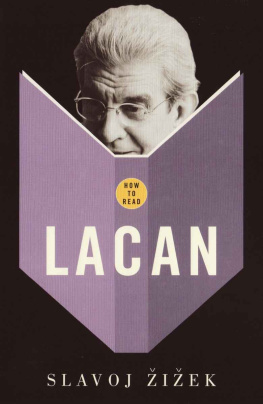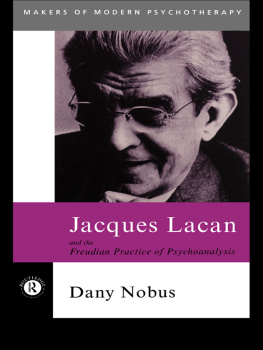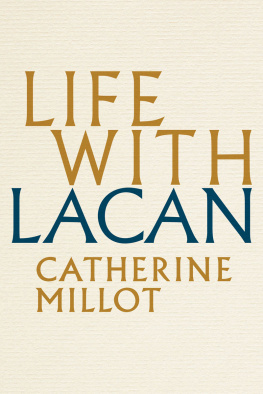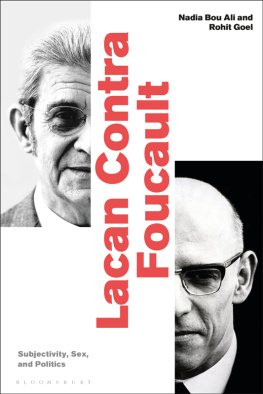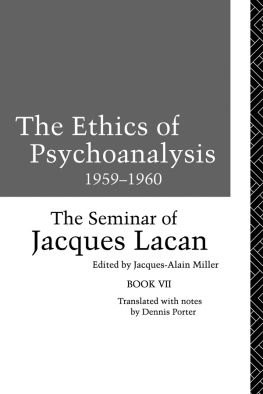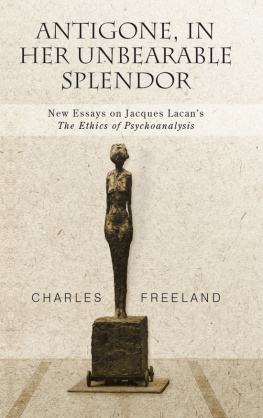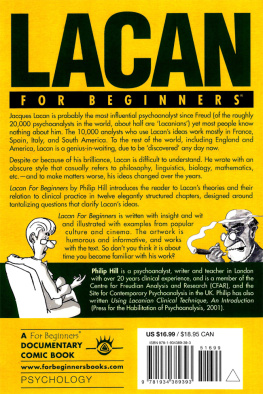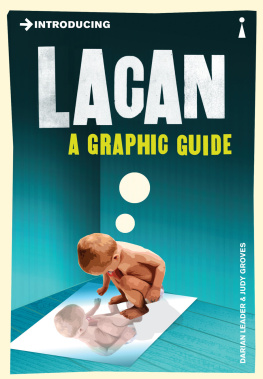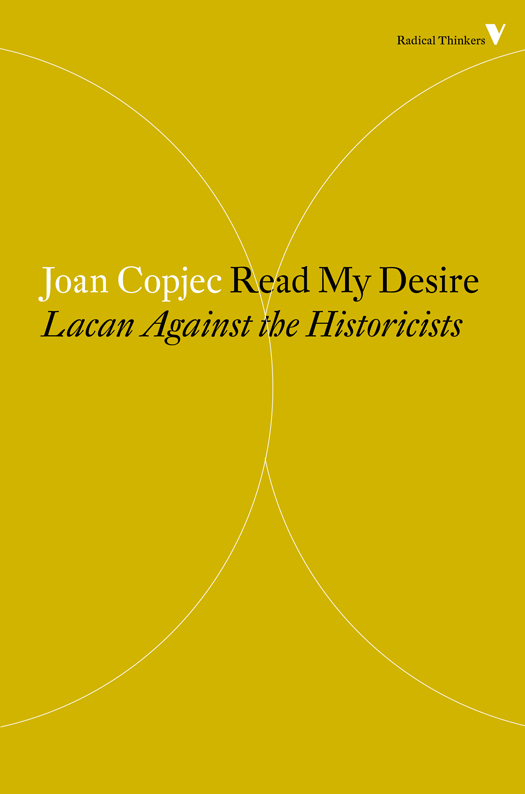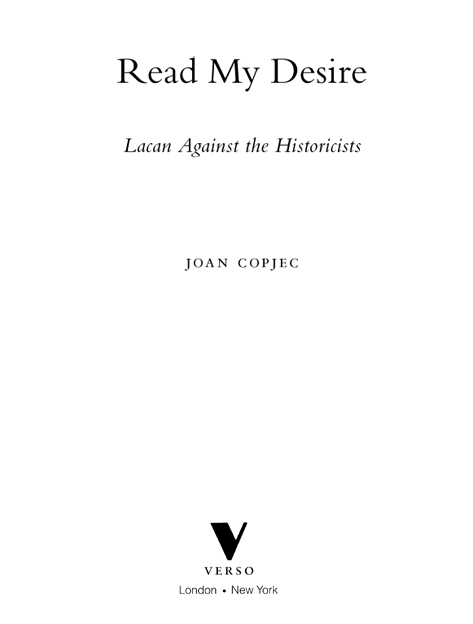This edition published by Verso 2015
First published by MIT Press 1994
Joan Copjec 1994, 2015
All rights reserved
The moral rights of the author have been asserted
Verso
UK: 6 Meard Street, London W1F 0EG
US: 20 Jay Street, Suite 1010, Brooklyn, NY 11201
www.versobooks.com
Verso is the imprint of New Left Books
ISBN-13: 978-1-78168-888-5 (PB)
eISBN-13: 978-1-78168-889-2 (US)
eISBN-13: 978-1-78168-890-8 (UK)
British Library Cataloguing in Publication Data
A catalogue record for this book is available from the British Library
Library of Congress Cataloging-in-Publication Data
A catalog record for this book is available from the Library of Congress
v3.1
To my mother, Ann,
and the memory of my father, John Copjec
Contents
Acknowledgments
One reason writing is so difficult is that one feels, while doing it, completely alone. Yet if this were true, writing and thinking would be impossible. The big Other aside (I dont, after all, know his or her name), it is to a number of others that I have addressed myself in writing this book and who have made it, literally, possible.
My debts were incurred in waves, two of them. The first was the period, beginning in the mid- to late-1970s, when Screen and m/f were publishing their ground-breaking texts, when Screen readers meetings, the Filmmakers Co-op in London, the Milwaukee conferences were sites of intense debates that marked me for good. I often regret that I have not seen their like since, that the rigor and excitement, the aura of urgency, commitment, and community that surrounded them, seem largely to be absent from more contemporary exchanges. I owe a great deal to the people who staged and participated in these earlier debates, and especially to a few friends whom I associate still, for various reasons, with the values they represented and the important theoretical projects they began: Parveen Adams, Homi Bhabha, Elizabeth Cowie, Mary Ann Doane, and Sandy Flitterman-Lewis.
The second wave coincided with the period when I began to define my own work not according to the object of my study, nor even as broadly theoretical, but, specifically, as Lacanian. At this moment I began to incur debts to Slavoj iek, who has helped me to see that the distance between abstract theory and concrete analysis can be creatively bridged, and without loss to theory; to Juliet MacCannell and Renata Salecl, who have become allies in the project of bringing Lacan and feminists to the negotiating table; to Jacques-Alain Miller, who in his seminars and in conversation opened up for me a political reading of Lacan that many other interpreters had almost entirely obscured.
To each of these lists I must add a single name, that of Joel Fineman, whose death diminished both theoretical worlds by a significant sum.
My efforts at writing were also sustained by two different professional contexts. The first was, of course, the journal October, where my coeditors, Douglas Crimp, Rosalind Krauss, and Annette Michelson, supplied me with ample space and encouragement to develop the arguments of the earlier chapters of this book. The second is the English and Comparative Literature departments at the University of Buffalo and my many colleagues there. I hesitate in this case to single names out for special mention for fear the list would grow too long. I do have to thank separately, however, the students in my seminars, who have, through their eagerness, intelligence, and interest, inspired me. I would also like to thank Bill Fischer for arranging for me to have leave time to put the final touches on the book. My colleagues at the Center for the Study of Psychoanalysis and Culture also deserve separate mention for giving psychoanalysis such a solid home, not only during the good times, when psychoanalysis was the hot discourse, but during the bad times as well. Thanks, too, to Joan Cipperman for her years of sustaining service to the Center.
I want to thank Roger Conover at the MIT Press for all his help, especially at one crucial moment when his editorial intervention proved decisive. Jenya Weinreb was a speedy, thorough, and very pleasant copyeditor of the final text; I thank her for her care.
Finally, I thank my husband, Michael Sorkin, for so much, including the fact that he would prefer that I not delay my book any longer while I try to figure out how to acknowledge him properly. Wise; because he knows that this, at least, is not possible.
Introduction: Structures Dont March in the Streets
In May 1968, an angry French student scrawled across the blackboard of one of the classrooms at the Sorbonne a sentence that immediately became a slogan for student discontent: Structures dont march in the streets. A modern equivalent of the Wordsworthian Up, up, my friends and quit your books, the French phrase was accompanied by none of the ambivalence that surrounded its predecessor and targeted a specific, indigenous form of intellectualismstructuralismwhich seemed to these students to be wholly dead and thus completely incapable of rising to the theoretical challenge posed by the urgent and chaotic events in whose midst they now found themselves. Structuralism was denounced for its universalizing program and for its adherence to empty, moribund forms, conceived at all times to be always already in place, sedimented. The dynamics of this student revolt were such that it unreflectively led to the celebration of precisely that which structuralism seemed designed to exclude: not simply the particular, but the particular in its most spontaneous and concrete form.
In the post-1968 years, celebration solidified into a number of concepts, one of which, that of the pleb, has had a substantial influence on a certain strain of political discourse, up to and including the present, where, under the banner of multiculturalism or political correctness, it sometimes returns. Proposed first by Andr Glucksmann, this concept named some pure instance of particularity that had the potential to undermine all the universalizing structures of power. The pleb, as she or he was embodied in workers, students, immigrants, all those made poor, sorry, worthless, or marginal by the society in place, was conceived as endowed with the immediacy of a knowledge (connaissance) which springs from the realities of suffering and resistance.definition, any discourse that originated with the pleb was thought to have a political value and correctness that was automatically foreclosed to discourses originating with those in positions of power.
Glucksmann developed his concept of the pleb with liberal borrowings from Michel Foucault, and Foucault, in turn, incorporated Glucksmanns concept into his own thinking. But not without reservations. Interviewed by the Rvoltes Logiques collective, Foucault uttered this warning regarding the pleb, which he described as the constant and constantly silent target for the apparatuses of power:
Without doubt the pleb must not be conceived of as the permanent foundation of history the never totally extinct hearth of every revolt. The pleb undoubtedly has no sociological reality. But there is indeed always something which in some way escapes the relations of power; something in the social body, in the classes, in the groups, in the individuals themselves which is not at all the more or less docile or reactive raw material, but which is the centrifugal movement, the inverse energy, that which escapes. The pleb, undoubtedly, does not exist; but there is plebness. This measure of plebness is not so much that which is outside relations of power as it is their limit. Taking this point of view of the pleb I do not think that [it] may be confused in any way with some neo-populism which substantifies the pleb, or some neo-liberalism which harps on the themes of its basic rights.


